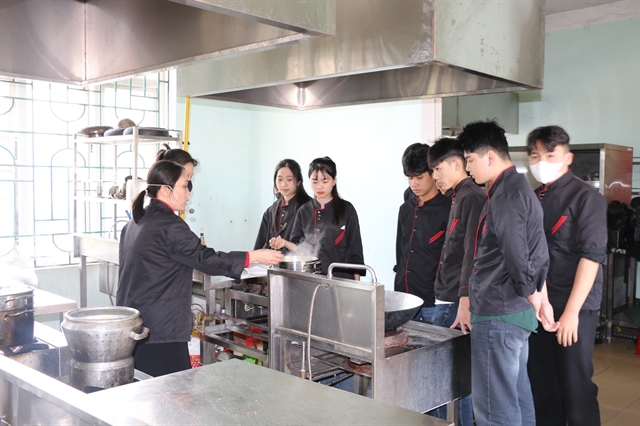 Society
Society

 |
| Students are in a practical period at a vocational school in the central province of Nghệ An. — VNA/VNS Photo Bích Huệ |
HÀ NỘI — As Việt Nam moves deeper into the digital era, the demand for a highly skilled workforce with digital competencies is growing. To meet this challenge, many vocational schools across the country, particularly in HCM City, are accelerating digital transformation initiatives aimed at shaping smart vocational schools. These efforts are intended to enhance training quality and align education more closely with the need of the labour market.
At Lý Tự Trọng College of HCM City (LTTC), classes are no longer confined to physical classrooms. Lecturers design digital learning materials, creating an online library that allows students to study flexibly from anywhere. Learners can engage in remote lessons while still mastering the operational processes of machinery through simulations on their computers.
Deputy Principal Đinh Văn Đệ noted that the school has invested heavily in digital teaching models, with the “flipped classroom” approach emerging as a highlight. Instead of beginning with lectures in class, lecturers prepare videos and theory materials online for students to review beforehand. Class time is then reserved for tackling complex problems, clarifying doubts, and deeper discussions.
According to Deputy Principal Phan Lệ Thu of Viễn Đông College in HCM City, the school integrates artificial intelligence, big data, and automation into teaching. Blended learning, virtual simulations, and digital resources are employed to ensure students adapt quickly to the evolving labour market.
Elsewhere, institutions such as Cao Thắng Technical College, HCM City College of Economics and Technology, and Thủ Đức College of Technology have begun applying criteria to evaluate “digital colleges.” Many are rolling out online learning systems, digital management platforms, shared open-education resources, and virtual reality labs.
Despite progress, significant hurdles remain. According to Deputy Director Phạm Vũ Quốc Bình of the Directorate of Vocational Education and Training, Việt Nam’s digital transformation programme for vocational education, approved in late 202,1, set a goal for 70 per cent of vocational institutions to apply digital teaching and management by this year.
Yet, after nearly three years, only just over half of the 1,545 institutions nationwide have implemented such changes.
The teaching workforce also reflects uneven readiness. Việt Nam has nearly 72,000 vocational educators, but only 30 per cent hold a master’s degree, and less than half have bachelor’s degrees.
Around 70 per cent meet professional skill standards, with just half capable of delivering integrated teaching that blends theory and practice. Outdated curricula, slow updates to reflect new technologies, and obsolete equipment further complicate efforts to modernise training in high-tech fields.
Bình emphasised that schools must make extraordinary efforts to meet the 2025 target. This includes prioritising the digitalisation of teaching materials, strengthening the application of emerging technologies in both instruction and management, and focusing on areas of institutional strength to drive transformation.
Experts believe digital transformation, combined with experiential learning, will be decisive in reshaping vocational education.
Trần Anh Tuấn, Vice Chairman of the HCM City Vocational Education Association, stressed the need for holistic integration from digital governance to standardised data management. He underlined that investment in technological infrastructure and modern equipment will be crucial to creating an effective and forward-looking training environment.
For Việt Nam, the push toward smart vocational schools represents more than a technological shift. It is a strategy to ensure the country’s workforce can thrive in an economy where digital skills and adaptability are no longer optional, but essential. — VNA/VNS




